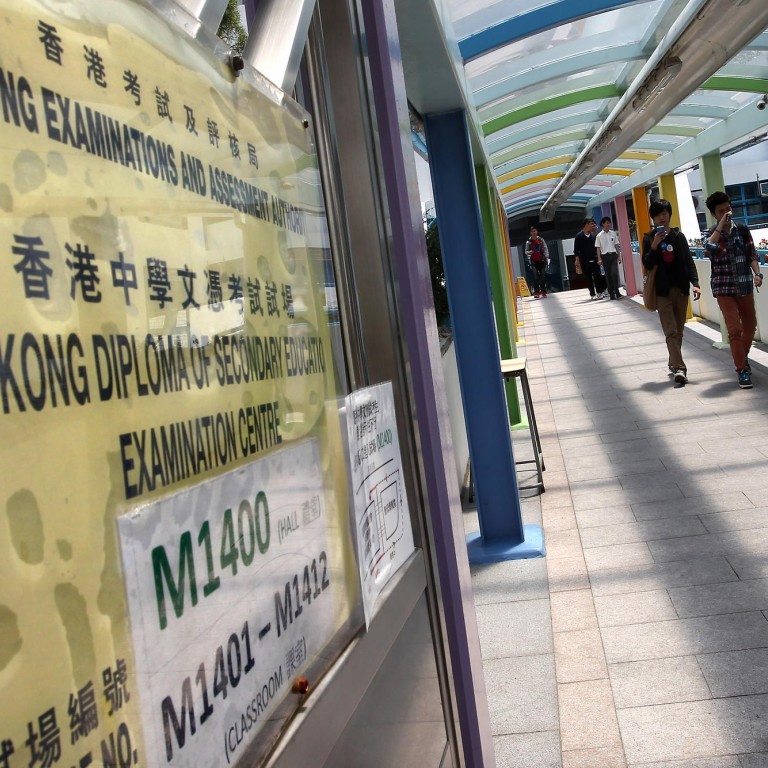
Overseas universities are happy with HKDSE, but getting a place is still competitive
There will be no shortage of study options for students who receive their Hong Kong Diploma of Secondary Education (HKDSE) results today.
There will be no shortage of study options for students who receive their Hong Kong Diploma of Secondary Education (HKDSE) results today. Competition for places in some disciplines or colleges could even be lower, due to a smaller number of candidates.
A total of 79,615, among them 66,613 school candidates (as opposed to private candidates), sat this year's exam. That's down from last year's total of 82,350, which included 71,222 school candidates.
The downward trend is likely to continue, given the falling student population in Hong Kong. Some community colleges have stopped hiring new staff in anticipation of this falling recruitment.
But there is no let-up in the aspirations of parents and students. On the contrary, many families regard their children's education as their top priority. For many, the ultimate goal is for them to enter a top university. So public examination results count as much as ever, regardless of the number of candidates.
This overseas recognition ... makes studying abroad a highly viable option for many candidates
To the relief of many, the HKDSE, launched in 2012 as part of the 334 academic structure reform, which extends the duration of university study to four years from three, has been well received by universities abroad.
According to the Hong Kong Examinations and Assessment Authority, 173 tertiary institutions worldwide have published their admission requirements for HKDSE holders. During a recent tour to Australia, chairman of the authority Rock Chen Chung-nin met Hong Kong students studying for degrees there.
The students told him that the curriculum leading to the HKDSE had "opened up their inquisitive mind". Perhaps the compulsory course of liberal studies should get credit for this.
Chen cited leading UK institutions, including Oxford, Cambridge, Imperial College London, and University College London, as colleges that were happy with the overall performance and language proficiency of students who had applied with their HKDSE results.
The UK's centralised admissions body, UCAS, has on its website the tariff point equivalents for local exam results. For example, levels 3 to 5** are comparable to those awarded to the GCE A-levels, and the tariff points awarded for level 5** is slightly higher than those awarded for grade A* in GCE A-levels.
More than half of the British institutions that have acknowledged the acceptance of the diploma, also accept the results of HKDSE English Language as a credential of English-language proficiency. This ranges from level 3 to level 4/5, depending on the programme.
This overseas recognition is welcome news. It makes studying abroad a highly viable option for many candidates. But the curriculum reform leading to the examination hardly removes the pressure facing students, and it may intensify it.
Most sit seven subjects in the exam, including the four compulsory subjects of Chinese, English, maths and liberal studies. This means they have little time for other subjects, or broad academic pursuits.
Many concentrate on improving their language skills, knowing that local universities are unlikely to accept them if they do not achieve at least level 3 in Chinese and English.
"The HKDSE is developed to give students a range of abilities as a basis to plan for their different pathways in the future, rather than just allowing everyone to enter to universities," says Chen.
It is questionable if such a goal is being achieved. There are admirable intentions behind the reform, but in the context of a competitive environment, and a culture which emphasises academic achievement, freeing students from the pressure of studying is no easy task.
The pressure is exacerbated because top universities are flooded with applications from around the world.
Schools must continue to improve their teaching, improve on their facilities, expose students to a host of extra-curricular activities, and achieve good results in public examinations.
But let's hope they will also leave more room for students (and teachers) to think about what they want to do with their lives.
